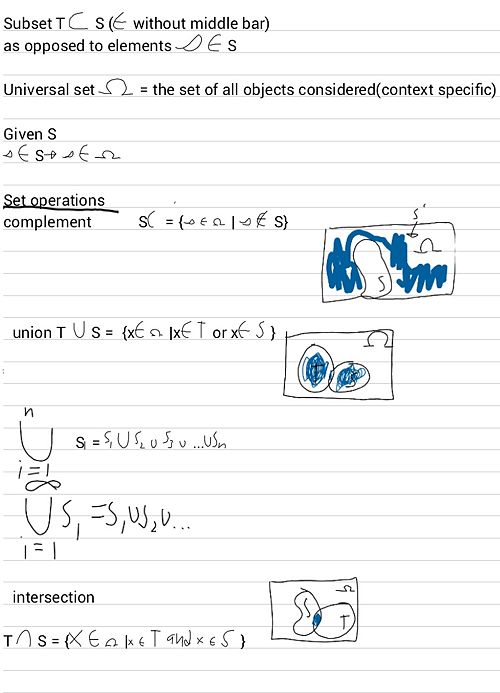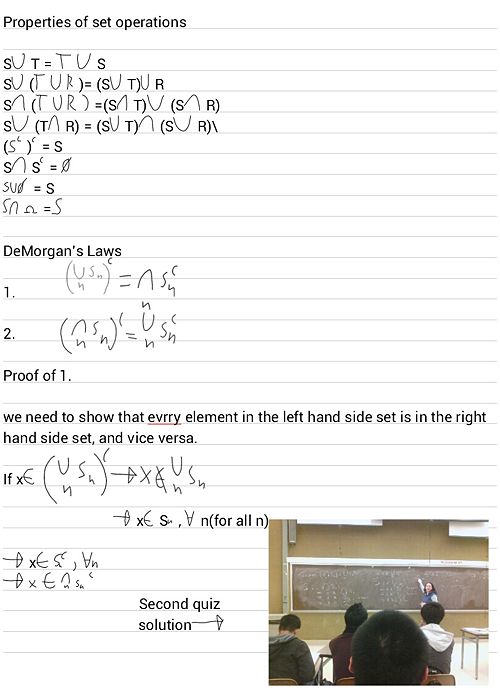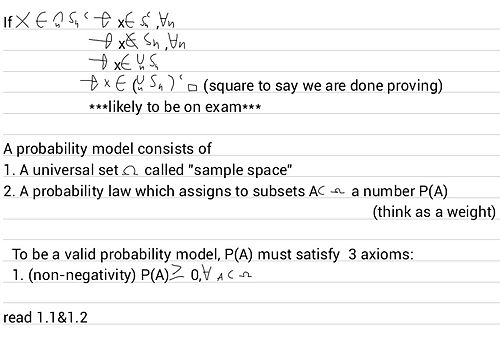(complete LATEX conversion) |
|||
| Line 1: | Line 1: | ||
| − | + | <br> 1/9/13 <br> | |
| − | <br> 1/9/13 | + | <!-- \mathbb{} is used to get the "mathbook" font introduced within the math function--> |
| − | + | <math>\mathbb{}\text{If S is discrete and finite S = } \{S_1, S_2, S_3\}, \text{ S = } \{head,tail\}, S = \{win, lose\}, S = \{1,2,3,4,5,6\}</math> | |
| − | If S is discrete and finite S = { | + | <br><math>\mathbb{}\text{If S is discrete but infinite, S = } \{S_1,S_2,S_3,...\}. \text{ Example: S = }\{1,2,3,4,...\} </math> |
| − | + | <br><math>\mathbb{}\text{S = }\{\sin(2\pi*440t),\sin(2\pi*880t),\sin(2\pi*1320t),...\}</math> | |
| − | If S is discrete but infinite, | + | <br><math>\mathbb{}\text{Observe }\text{S = }\{\mathbb{R}\} \text{ is not routable; S = }\{0,1\} \text{ is not routable.}</math><br><math>\mathbb{}\text{S = } f \in \mathbb{R} \geq 0</math> |
| − | + | <br><math>\mathbb{}\text{S = }\{\sin(2\pi*f*t) \mid 0 \leq f \leq \infty \}</math> | |
| − | S = { | + | <br><math>\mathbb{Z} \text{ is all integers -}\infty \text{ to } \infty</math>  |
| − | + | <br><math>\text{Is } \mathbb{Z} \text{ routable? yes.}</math> | |
| − | + | <br><math>\mathbb{Z} = \{ 0,1,-1,2,-2,3,-3,... \} \text{ as opposed to } \mathbb{R}</math> | |
| − | + | <br><math>\mathbb{R} = \{0,3,e,\pi ,-1,1.14,\sqrt{2}\}</math> | |
| − | + | <br><math>\mathbb{}\text{Many different ways to write a set } [0,1] \text{ = } \{ x \in \mathbb{R} \text{ such that (s. t.) } 0\leq x \leq 1 \} </math> | |
| − | + | <br><math>\mathbb{} = \{ \text{real positive numbers no greater than 1 as well as 0} \} </math> | |
| − | + | ||
| − | <math>\mathbb{Z} | + | |
| − | + | ||
| − | + | ||
| − | + | ||
| − | + | ||
| − | + | ||
| − | <math>\mathbb{R} | + | |
| − | + | ||
| − | Many different ways to write a set [0,1] = { | + | |
[[Image:100 3.jpg|left|500x700px]] | [[Image:100 3.jpg|left|500x700px]] | ||
Revision as of 21:21, 13 May 2014
1/9/13
$ \mathbb{}\text{If S is discrete and finite S = } \{S_1, S_2, S_3\}, \text{ S = } \{head,tail\}, S = \{win, lose\}, S = \{1,2,3,4,5,6\} $
$ \mathbb{}\text{If S is discrete but infinite, S = } \{S_1,S_2,S_3,...\}. \text{ Example: S = }\{1,2,3,4,...\} $
$ \mathbb{}\text{S = }\{\sin(2\pi*440t),\sin(2\pi*880t),\sin(2\pi*1320t),...\} $
$ \mathbb{}\text{Observe }\text{S = }\{\mathbb{R}\} \text{ is not routable; S = }\{0,1\} \text{ is not routable.} $
$ \mathbb{}\text{S = } f \in \mathbb{R} \geq 0 $
$ \mathbb{}\text{S = }\{\sin(2\pi*f*t) \mid 0 \leq f \leq \infty \} $
$ \mathbb{Z} \text{ is all integers -}\infty \text{ to } \infty $ 
$ \text{Is } \mathbb{Z} \text{ routable? yes.} $
$ \mathbb{Z} = \{ 0,1,-1,2,-2,3,-3,... \} \text{ as opposed to } \mathbb{R} $
$ \mathbb{R} = \{0,3,e,\pi ,-1,1.14,\sqrt{2}\} $
$ \mathbb{}\text{Many different ways to write a set } [0,1] \text{ = } \{ x \in \mathbb{R} \text{ such that (s. t.) } 0\leq x \leq 1 \} $
$ \mathbb{} = \{ \text{real positive numbers no greater than 1 as well as 0} \} $
Go to lecture notes: 2 3 4 6 7 8 9 10 12 18 20 32 35 37 38 39 40 41 42 43 44




